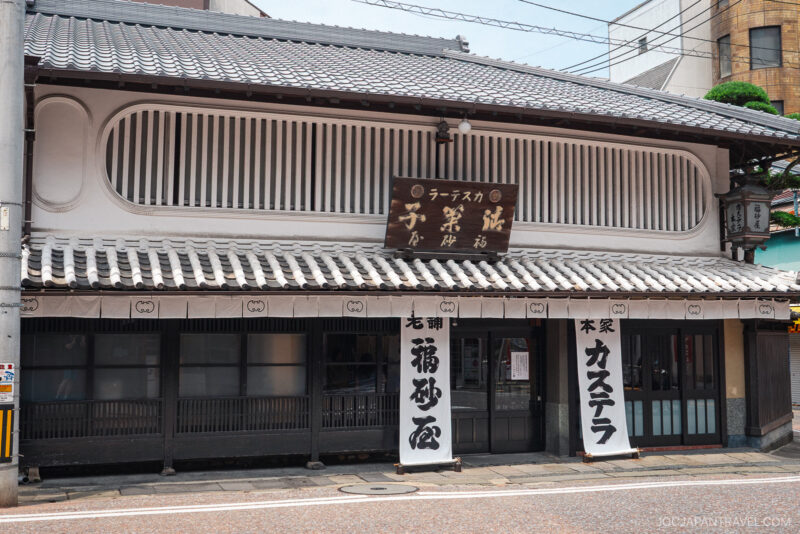This post may contain affiliate links. Please read our disclosure policy.
Soft, spongy, and full of history, Nagasaki castella cake is one of Japan’s most iconic desserts—a delicious reminder of the city’s centuries of cultural exchange.

The Origins of Castella in Japan

Castella cake has a story as rich as its flavor. In the 16th century, Portuguese merchants introduced Pão de Castela (“bread from Castile”) to Japan through the port of Nagasaki. Unlike most of Japan, which remained closed during the sakoku (isolation) era, Nagasaki was open to limited foreign trade. Along with goods and ideas came sugar, an expensive rarity at the time, and recipes for European sweets.
Over the years, Japanese bakers adapted the cake to local tastes. Today’s Nagasaki castella is denser, moister, and sweeter than its European ancestor, made with just four ingredients: flour, eggs, sugar, and starch syrup. It’s often paired with green tea and is one of the city’s most popular souvenirs.
Where to Try Castella in Nagasaki
We couldn’t leave Nagasaki without tasting its most famous sweet: castella. Each shop has its own history and little twist, and visiting them felt like tasting pieces of the city’s story.
Fukusaya Castella (福砂屋) – Since 1624

Founded in 1624, Fukusaya is the oldest castella shop in Nagasaki.
What to expect:
- A traditional wooden storefront with cloth noren curtains
- A bat logo, a Chinese symbol of good fortune
- Classic castella, Hollander cake (chocolate with walnuts and raisins), and monaka (red bean wafer sweets)
This shop is takeaway only, but that didn’t stop us from grabbing a few slices. We loved the firm sponge with its caramelized bottom—a timeless taste of Nagasaki.
Shooken Castella (松翁軒) – Since 1681

Bright and welcoming, Shooken offers both traditional castella and creative variations.
Highlights:
- A second-floor café where you can sit and recharge
- Antique shelves displaying vintage ceramics and glassware
- Varieties including original, chocolate, matcha, and Gosanyaki (五三焼), a premium castella with extra egg yolks and sugar
Our favorite was the Gosanyaki. Rich and creamy, it felt like the dessert version of luxury.
Bunmeido (文明堂) – Japan-Wide Favorite
Bunmeido is the most widely recognized castella brand in Japan, with shops in major cities and airports. While we didn’t make it to the Nagasaki location, it’s an easy way to enjoy castella outside the city.
Nami’s Homemade Castella Recipe
Of course, if you’d like to try baking it yourself, we’d love for you to make Nami’s Castella Cake recipe.
After a few trials and errors, she finally got it just right—and our family swears it’s the best! We hope you’ll try it and let us know how it turns out.
How to Get to Nagasaki Castella Shops
These shops sit in central Nagasaki, close to Dejima, Glover Garden, and Shinchi Chinatown. The tram is the easiest way to get around.
Fukusaya Main Store
- Nearest tram: Shianbashi Station, about 3 minutes on foot
Shooken Kanko-dori Street Shop
- Nearest tram: Kanko-dori, about 1–3 minutes on foot
Bunmeido Main Store
- Nearest tram: Ohato, about 1 minute on foot
Should You Try Castella Cake in Nagasaki?

Eating castella in Nagasaki is more than just enjoying dessert. It’s experiencing history in every bite. We loved sampling the subtle differences between shops and learning how this foreign recipe evolved into a Japanese classic.
If you enjoy wagashi (traditional Japanese sweets) or sponge cakes with a cultural twist, Nagasaki castella is a must-try.
More to Explore Nearby
Once you’ve had your fill of castella, Nagasaki has plenty more to offer nearby:
- Dejima – A restored man-made island that once served as Japan’s only window to the West
- Glover Garden – A hillside museum of 19th-century Western homes and festival culture
- Oura Church – Japan’s oldest standing Catholic church and a UNESCO World Heritage site
- Shinchi Chinatown – The country’s oldest Chinatown, filled with food and history




